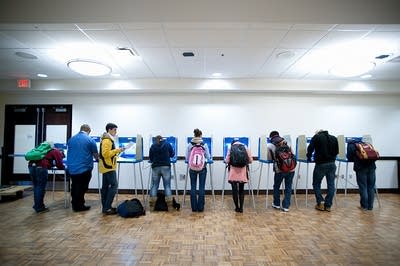Fixing Minneapolis voting problems; honoring Gordon Parks
Go Deeper.
Create an account or log in to save stories.
Like this?
Thanks for liking this story! We have added it to a list of your favorite stories.

Today on the MPR News Update we're covering detailed reports about the voting problems in Minneapolis, the pricing policies of companies who want your Christmas shopping business, a new scan for prostate cancer, high schools students who honor Gordon Parks everyday of the year, and more.
VOTING BOTTLENECKS: Long lines at Minneapolis polling sites this November were caused mainly by high turnout and same-day registrations, according to a new report. But ballot machine problems, even faulty ballpoint pens, also caused delays at some polling sites. The report makes more than 20 recommendations, many of which will require legislative action, to fix the problems.
(NOT) ALWAYS LOW PRICES: Apple, Sony, Bose and many other prestigious manufacturers try to keep their prices from falling in a highly competitive retail environment through the use of minimum advertised price policies. The strategy can sometimes put them at odds with retailers such as Best Buy and Target.
GORDON PARKS: This year marks the 100th anniversary of the birth of the late Gordon Parks, a groundbreaking African-American photographer, filmmaker, writer and musician who spent his teen years in St. Paul. Over the past few months, celebrations have been held in places like the Minnesota History Center and the U.S. embassy in Paris. But Gordon Parks High School honors the legacy of the man every day of every year.
Turn Up Your Support
MPR News helps you turn down the noise and build shared understanding. Turn up your support for this public resource and keep trusted journalism accessible to all.
PROSTATE SCAN: When treating cancer patients who suffer a second bout of the disease, doctors know catching the recurrence soon is crucial to the patient's chances of survival. It's especially been a challenge with prostate cancer. That's why a new Mayo Clinic scanning technique that helps doctors detect recurring prostate cancers months or even years earlier than before, is receiving considerable attention.
FLU SEASON: Suspected flu cases have jumped in five Southern states, and the primary strain circulating tends to make people sicker than other types. It is particularly hard on the elderly, according to the CDC. The good news is that the nation seems fairly well prepared.
EAR PAIN: Now that it's December, college students are wrapping up their work for the fall semester, turning in final papers and giving their final presentations. Gary Dop will be one of the professors listening to those presentations, and over the years he's sat through some memorably bad ones. So he's written a poem to help them head off their mistakes.
COLD SPRING SHOOTING: Cold Spring police Officer Tom Decker, who was killed last week in what authorities say was an ambush, once helped Lisa Stukey when she feared an intruder was inside her home. So she organized a candlelight vigil so she could thank the officer "one last time." Meantime, authorities still don't have enough evidence to charge his suspected killer.
ARMED AND SLEEPING: In October, a Richfield police officer responding to a call of a suspicious vehicle. It turns out the 26-year-man who was asleep in the driver's seat had been convicted of multiple felonies including assault with a dangerous weapon and possession of stolen property. Now, a search warrant made public shows that 19 shotguns and rifles, as well as boxes of ammunition, were in the van.
CARP SUIT TOSSED: A federal judge Monday threw out a lawsuit filed by five states, including Minnesota, that want barriers placed in Chicago-area waterways to prevent Asian carp from invading the Great Lakes, but said he would consider new arguments if the case were filed again.
MORE CLIFF NOTES: With the Jan. 1 "fiscal cliff" looming and the government eager to find ways to boost revenue collection, might popular tax deductions be in danger? John Friedman, an assistant professor of public policy at Harvard's Kennedy School of Government, will join The Daily Circuit today to talk about it. Also joining the program will be Eugene Steuerle, a fellow at the Urban Institute. Click here later today to hear audio from the show.
INTELLIGENCE SQUARED: Should we legalize drugs? Supporting the proposition in this debate are Paul Butler, a former federal prosecutor and professor of law at Georgetown, and Nick Gillespie, editor-in-chief of Reason.tv and Reason.com. Opposing are former DEA and administrator Asa Hutchinson, and Theodore Dalrymple, a retired prison doctor and Dietrich Weismann Fellow at the Manhattan Institute. Click here later to hear the debate.
FACEOFF: National Hockey League players and owners try something new today in an effort to end the NHL lockout: The two sides are meeting face-to-face, without mediators and without the usual group of union leaders and owner representatives who've so far failed to reach an agreement.
JOB CREATORS: The Shakopee City Council is considering a proposal tonight from Emerson Electronics to bring about 500 jobs to the city. The company would take over an existing facility that's been empty for 13 years under a proposal.



